Allergy
Blood Diseases
Bone & Joints
Brain
Cancer
Child Care
Cosmetic Surgery
Diabetes
Endocrinology
ENT
Eye
Gen Medicine
General Surgery
Heart
Kidney
Lifestyle
Liver & Digestive
Lung
Men’s Health
Mental health
Physiotherapy
Rheumatology
Skin and hair
Sleep Disorders
Spine
Transplant
Women Health
Thyroid
Vascular Surgery
Eczema - Causes, Symptoms & Treatment

What is Eczema?
Eczema, also known as Atopic dermatitis refers to an inflammation of the skin characterized by an itchy, red rash, and cracked skin oozing clear fluid followed by thickening and hardening of the affected skin. It is a non-contagious, long-term skin disorder which appears mostly on the back of the knees, feet, ankles, wrists, elbows, upper neck, face, and scalp. Infants can develop Eczema on the scalp and cheeks, which can continue into adolescence and adulthood.
Alternate names
- Atopic Eczema
- Infantile Eczema
- Prurigo Besnier
- Allergic Eczema
- Neurodermatitis
Is Eczema a Medical emergency?
Eczema is not a medical emergency.
Causes of Eczema
- Genetic changes
- Exposure to irritants and allergens
- Consumption of some foods and medicines
Risk Factors of Eczema
Factors that influence the development of Eczema include:
- Family history of Eczema
- History of allergies
- History of hay fever or asthma
- Exposure to dust mites
- High levels of stress and anxiety
Triggering Factors of Eczema
The following are the triggering factors that make Eczema worse:
- Warm water baths
- Foods like nuts and dairy
- Extreme cold or extremely hot temperatures
- Exposure to skin irritants like wool, synthetic clothing, cosmetics, soaps, perfumes, detergents, and other chemicals
- Signs & Symptoms of Eczema
- Dry skin
- Red to brownish-grey color patches on the skin
- Small raised bumps, which may leak fluid and crust from scratch
- Severe itching sensation that is worse at night
- Thickened, cracked, and scaly skin
- Painful and swollen skin from scratching
Investigations
There are no investigations or tests to diagnose Eczema. Patch tests are done to identify any allergens or irritants that can cause Eczema.
Diagnosis of Eczema
A diagnosis of Eczema is made based on medical history, clinical evaluation, and results of investigations if any.
Treatment Options for Eczema
There is no cure for Eczema. Management of Atopic Dermatitis focuses on easing the symptoms and reducing the frequency of flare-ups.
Medical treatment
Medical treatment for Eczema includes the following:
- Corticosteroids: Topical corticosteroid cream and ointments such as hydrocortisone and oral corticosteroids such as prednisone are administrated to control itching and repair the skin.
- Systemic immunosuppressants: Medications like ciclosporin, methotrexate, interferon-gamma-1b, mycophenolate mofetil, and azathioprine are used in Atopic Dermatitis treatment.
Interventional treatment including surgery and indications for surgery/ Surgical treatment
- Light therapy: The affected area is exposed to sunlight. This helps to decrease the severity and frequency of the flare-ups.
- Wet dressing therapy: Topical corticosteroids are applied to the affected area and wrapped with a wet dressing to promote healing.
Role of Diet/ Exercise/ Lifestyle changes/ Preventive measures
Lifestyle modifications and preventive measures for Atopic Eczema include the following:
- Moisturizing the skin at least twice a day
- Avoiding irritants that trigger the condition such as sweat, soaps, detergents, dust, chemical solvents, etc
- Take a bath with warm water rather than hot water
- Using only mild soaps on the skin
- Wearing smooth texture clothes rather than tight clothing
- Avoiding scratching
- Applying anti-itch cream or ointment. (oral allergy medications or anti-itch medications can be taken)
- Covering the skin with bandages to avoid scratching
Management of Atopic Eczema in children and infants includes the following:
- Avoid irritants and allergens that cause skin irritations
- Avoid extreme temperatures
- Moisturize the skin with creams, bath oils, and ointments
Complications
Atopic Dermatitis can lead to the following complications:
- Asthma and hay fever
- Skin infections
- Long-term itchy and scaly skin
- Allergic contact dermatitis
- Sleep problems
Prognosis
The prognosis of Eczema is good in children. Atopic dermatitis disappears after puberty in most children, however, in a few cases, it can be present in adolescence and adulthood. In adults, the prognosis of atopic dermatitis is poor. The disease goes into remission (disease-free period) for about a few months and reappears again after a few months.
When to contact the doctor? / How to identify the complications?
Medical consultation is recommended after noticing any rash associated with fever and signs of infection.
Indications for hospitalization
Hospitalization is generally not required.
Suggested clinical specialists / Department to consult for this condition
Dermatology
Was this article helpful?
YesNo
Comments





